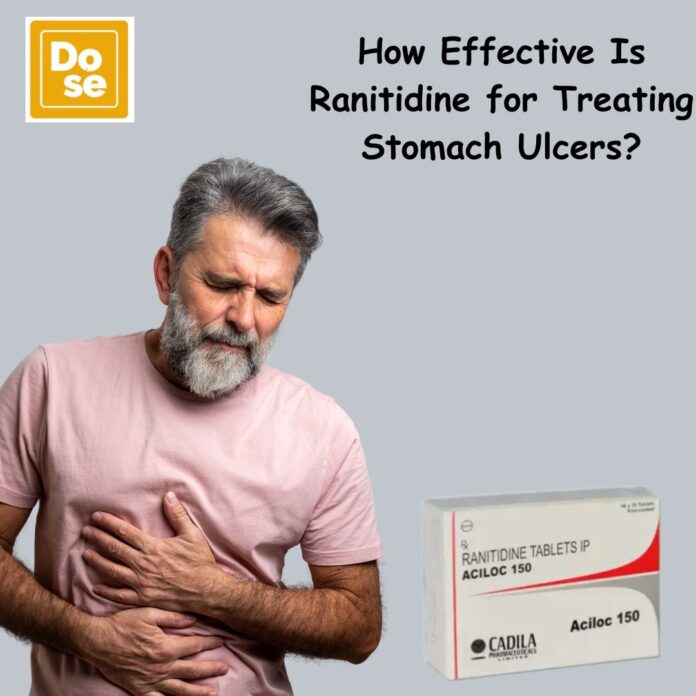Introduction
Stomach ulcers, also known as gastric ulcers, are painful sores that develop in the lining of the stomach due to excessive acid production, bacterial infections, or prolonged use of certain medications like NSAIDs. One medication that has been widely used in the past for treating stomach ulcers is Ranitidine 150 mg. This article explores how effective ranitidine is in treating stomach ulcers, its mechanism of action, safety concerns, and alternative treatments available today.
Understanding Stomach Ulcers
Stomach ulcers occur when the protective mucus lining of the stomach is eroded, allowing stomach acid to damage the underlying tissues. The most common causes of stomach ulcers include:
- Helicobacter pylori (H. pylori) infection
- Long-term use of NSAIDs (nonsteroidal anti-inflammatory drugs) such as aspirin or ibuprofen
- Excessive acid production due to stress or medical conditions
- Smoking and alcohol consumption, which can weaken the stomach lining
What is Ranitidine?
Ranitidine is a histamine-2 receptor antagonist (H2 blocker) that was widely used to reduce stomach acid production. You can also take buy ranitidine 150 mg online from dose pharmacy. By blocking histamine, which stimulates acid secretion, ranitidine helps lower acid levels in the stomach, thereby promoting ulcer healing and relieving symptoms like pain and heartburn.
Effectiveness of Ranitidine for Stomach Ulcers
1. Acid Reduction and Ulcer Healing
- Ranitidine effectively reduces stomach acid production, which allows ulcers to heal over time.
- Studies have shown that ranitidine can heal ulcers within 4-8 weeks in most patients when taken regularly.
- It has been particularly effective in treating duodenal ulcers and gastric ulcers caused by excessive acid secretion.
2. Symptom Relief
- Many patients reported significant relief from pain and discomfort within days of starting ranitidine.
- It was commonly used for managing symptoms of acid reflux, heartburn, and indigestion, which often accompany stomach ulcers.
3. Comparison to Proton Pump Inhibitors (PPIs)
- While ranitidine was effective, later studies showed that proton pump inhibitors (PPIs) like omeprazole and esomeprazole were more effective at reducing acid production and promoting ulcer healing.
- PPIs work by completely blocking the acid-producing enzyme system in the stomach, making them superior for long-term ulcer management.
Safety Concerns and the Ranitidine Recall
1. The Discovery of NDMA Contamination
- In 2019, health regulators including the FDA (Food and Drug Administration) and EMA (European Medicines Agency) found that some ranitidine products contained NDMA (N-nitrosodimethylamine), a probable carcinogen.
- NDMA is a chemical that can form during the storage of ranitidine under certain conditions, posing potential cancer risks.
2. Market Withdrawal
- Due to these safety concerns, ranitidine was recalled and ultimately removed from the market in many countries, including the United States, Canada, and parts of Europe.
- Patients who were using ranitidine were advised to switch to safer alternatives under medical guidance.
Alternatives to Ranitidine for Treating Stomach Ulcers
Since ranitidine is no longer widely available, doctors recommend the following safer and more effective alternatives for stomach ulcer treatment:
1. Proton Pump Inhibitors (PPIs)
PPIs are now the preferred treatment for stomach ulcers due to their strong acid suppression effects.
- Common PPIs: Omeprazole, Pantoprazole, Lansoprazole, Esomeprazole.
- Benefits: Faster ulcer healing, longer-lasting acid reduction, and better symptom control.
- Considerations: Long-term use may lead to side effects like vitamin B12 deficiency and an increased risk of infections.
2. Other H2 Blockers
While ranitidine is no longer available, other H2 blockers remain on the market, including:
- Famotidine (Pepcid): Similar action to ranitidine but without NDMA concerns.
- Cimetidine: Another H2 blocker option, though less commonly prescribed.
3. Antibiotic Therapy for H. pylori Infections
- If H. pylori infection is the cause of an ulcer, a combination of antibiotics such as amoxicillin, clarithromycin, and metronidazole is prescribed along with a PPI.
4. Lifestyle Modifications
- Avoiding NSAIDs, smoking, and alcohol can help prevent ulcer recurrence.
- Eating a balanced diet rich in fiber and probiotics can promote stomach health.
Ranitidine was once a widely used and effective treatment for stomach ulcers, helping millions of patients find relief from acid-related conditions. However, due to concerns about NDMA contamination and potential cancer risks, it was withdrawn from the market in many countries. While it was effective, proton pump inhibitors (PPIs) have since become the preferred treatment due to their superior acid suppression and ulcer-healing properties. Patients who previously relied on it can now turn to safer alternatives like famotidine, PPIs, or antibiotic therapy for H. pylori infections. Anyone experiencing persistent ulcer symptoms should consult a healthcare provider to determine the best course of treatment.



